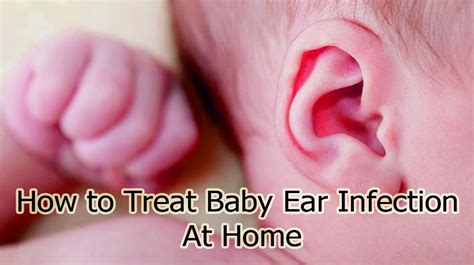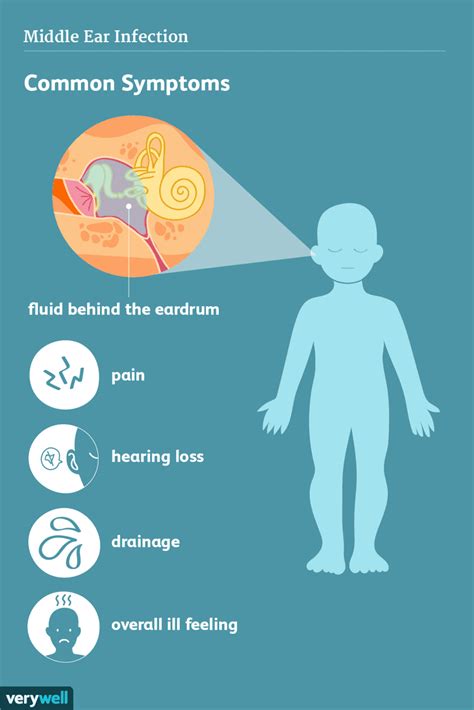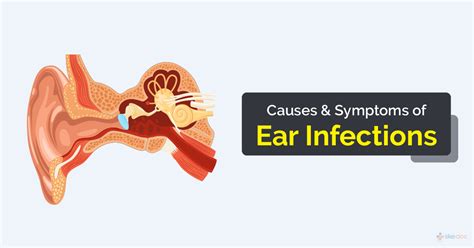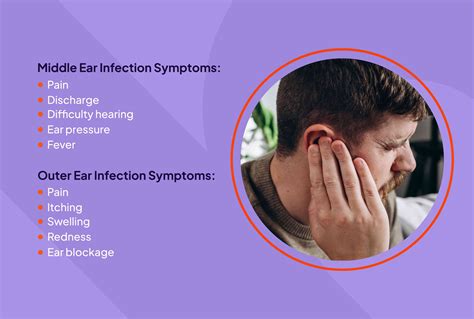Intro
As a parent, it can be distressing to see your baby suffering from an ear infection. Ear infections are common in babies and young children, and it's essential to recognize the signs and symptoms to provide timely treatment and prevent potential complications. Ear infections can be painful and uncomfortable for your little one, and if left untreated, they can lead to more severe issues, such as hearing loss or speech delays. In this article, we'll delve into the world of ear infections in babies, exploring the signs, symptoms, causes, and treatment options available.
Ear infections in babies can be caused by a variety of factors, including bacterial or viral infections, allergies, or environmental factors. The most common type of ear infection is otitis media, which occurs when fluid builds up in the middle ear and becomes infected. This can be a result of a cold, flu, or other respiratory infection, which can cause the Eustachian tube to become blocked, leading to a buildup of fluid in the middle ear.
Babies are more prone to ear infections due to their smaller Eustachian tubes, which can become easily blocked. Additionally, their immune system is still developing, making them more susceptible to infections. It's crucial to monitor your baby's behavior and watch for any signs of an ear infection, as early detection and treatment can help prevent long-term damage and promote healthy development.
Recognizing The Signs Of Ear Infection In Babies

Recognizing the signs of an ear infection in babies can be challenging, as they may not be able to communicate their discomfort or pain. However, there are several common signs and symptoms that parents can look out for. These include pulling or tugging at the ear, crying or fussing, especially when lying down, difficulty sleeping or waking up at night, loss of appetite or refusal to feed, and fever.
Babies with ear infections may also exhibit changes in behavior, such as becoming more irritable or restless, or displaying signs of discomfort, such as arching their back or neck. In some cases, babies may experience vomiting or diarrhea, which can be a sign of a more severe infection. It's essential to consult with a pediatrician if you suspect your baby has an ear infection, as they can provide a proper diagnosis and recommend treatment.
Causes And Risk Factors Of Ear Infections In Babies

Ear infections in babies can be caused by a variety of factors, including bacterial or viral infections, allergies, or environmental factors. The most common cause of ear infections is a bacterial infection, such as Streptococcus pneumoniae or Haemophilus influenzae. Viral infections, such as the common cold or flu, can also cause ear infections.
Allergies can also contribute to ear infections, as they can cause the Eustachian tube to become blocked, leading to a buildup of fluid in the middle ear. Environmental factors, such as exposure to cigarette smoke or air pollution, can also increase the risk of ear infections. Babies who attend daycare or are exposed to other children are also at a higher risk of developing ear infections.
Prevention And Treatment Options
Ear infections can be prevented by taking several precautions, such as breastfeeding, which can help to reduce the risk of ear infections. Keeping your baby upright during feedings can also help to prevent ear infections, as it can reduce the amount of pressure on the Eustachian tube.Avoiding exposure to cigarette smoke and air pollution can also help to reduce the risk of ear infections. Getting your baby vaccinated against flu and other respiratory infections can also help to prevent ear infections. Treatment options for ear infections in babies typically involve antibiotics, which can help to clear up the infection.
In some cases, your pediatrician may recommend a wait-and-see approach, especially if the infection is mild. This involves monitoring your baby's symptoms and providing pain relief, such as acetaminophen or ibuprofen, as needed. It's essential to follow your pediatrician's advice and complete the full course of antibiotics, even if your baby's symptoms improve before the medication is finished.
Complications And Long-Term Effects Of Ear Infections

Untreated or recurrent ear infections can lead to several complications and long-term effects, including hearing loss, speech delays, and learning disabilities. Repeated ear infections can cause damage to the eardrum or middle ear bones, leading to hearing loss.
Speech delays can also occur, as ear infections can affect a baby's ability to hear and process speech sounds. Learning disabilities can also be a long-term effect of ear infections, as hearing loss or speech delays can impact a child's ability to learn and succeed in school.
It's essential to seek medical attention if you suspect your baby has an ear infection, as early treatment can help prevent these complications and promote healthy development.
Home Remedies And Self-Care
There are several home remedies and self-care strategies that can help to alleviate the symptoms of an ear infection, including applying warm compresses to the affected ear, which can help to reduce pain and discomfort.Elevating your baby's head during sleep can also help to reduce congestion and promote drainage. Using a humidifier can also help to add moisture to the air, which can help to thin out mucus and promote drainage.
Providing plenty of fluids, such as breast milk or formula, can help to keep your baby hydrated and promote healing. Over-the-counter pain relievers, such as acetaminophen or ibuprofen, can also be used to help manage pain and discomfort.
When To Seek Medical Attention

It's essential to seek medical attention if you suspect your baby has an ear infection, especially if they are experiencing severe symptoms, such as a high fever, vomiting, or difficulty breathing.
If your baby is under six months old, it's crucial to seek medical attention immediately, as they are at a higher risk of complications. If your baby has a weakened immune system or an underlying medical condition, such as a heart condition or cystic fibrosis, it's also essential to seek medical attention promptly.
Diagnosis And Treatment
A diagnosis of an ear infection is typically made by a pediatrician, who will perform a physical examination and take a medical history. The pediatrician may use an otoscope to examine the eardrum and middle ear, and may also perform a tympanometry test to check for fluid in the middle ear.Treatment typically involves antibiotics, which can help to clear up the infection. In some cases, your pediatrician may recommend a wait-and-see approach, especially if the infection is mild. It's essential to follow your pediatrician's advice and complete the full course of antibiotics, even if your baby's symptoms improve before the medication is finished.
Conclusion And Next Steps

Ear infections in babies can be a challenging and distressing experience for parents. However, by recognizing the signs and symptoms, understanding the causes and risk factors, and seeking medical attention promptly, you can help your baby receive the treatment they need to recover and thrive.
If you suspect your baby has an ear infection, don't hesitate to reach out to your pediatrician for advice and guidance. With the right treatment and care, your baby can recover from an ear infection and develop healthy hearing and speech skills.
What are the common signs of an ear infection in babies?
+The common signs of an ear infection in babies include pulling or tugging at the ear, crying or fussing, especially when lying down, difficulty sleeping or waking up at night, loss of appetite or refusal to feed, and fever.
How can I prevent ear infections in my baby?
+You can prevent ear infections in your baby by breastfeeding, keeping your baby upright during feedings, avoiding exposure to cigarette smoke and air pollution, and getting your baby vaccinated against flu and other respiratory infections.
What are the potential complications of untreated ear infections in babies?
+Untreated or recurrent ear infections can lead to several complications and long-term effects, including hearing loss, speech delays, and learning disabilities.
We hope this article has provided you with valuable information and insights into ear infections in babies. If you have any further questions or concerns, please don't hesitate to reach out to your pediatrician or leave a comment below. Share this article with your friends and family to help spread awareness and promote healthy hearing and speech development in babies.
